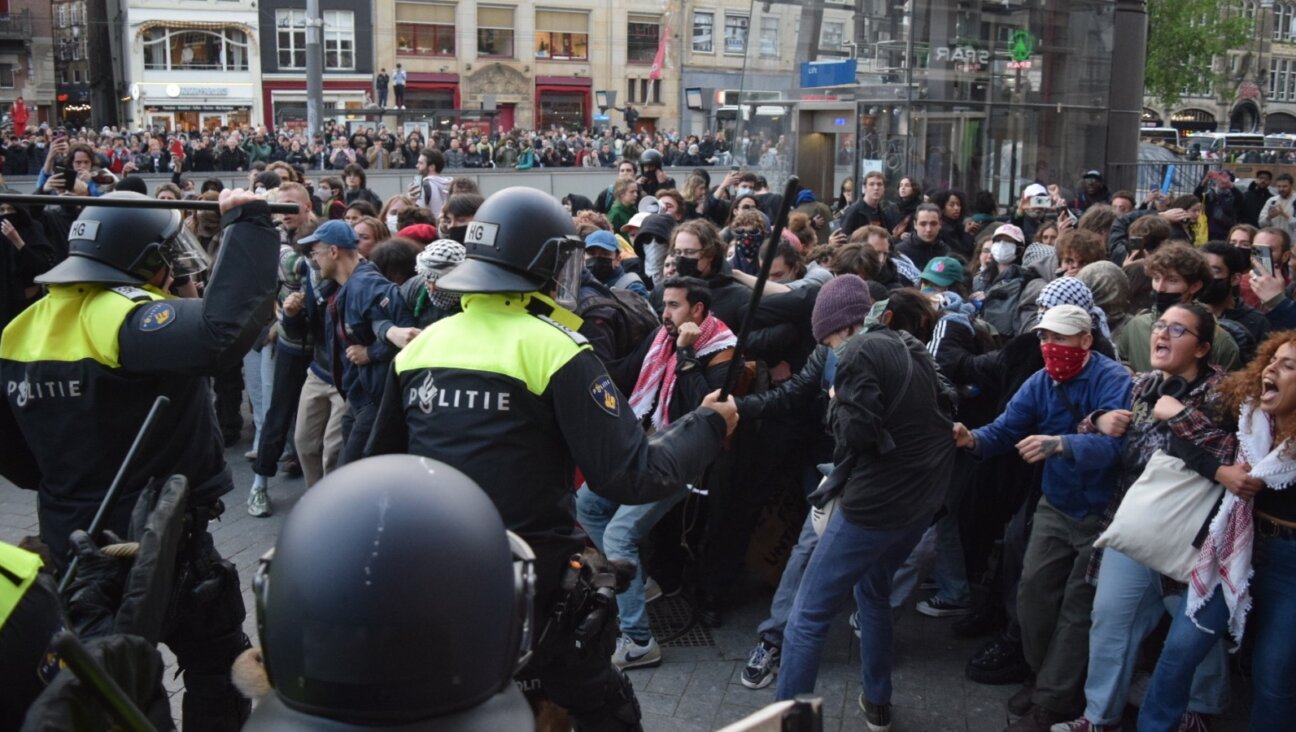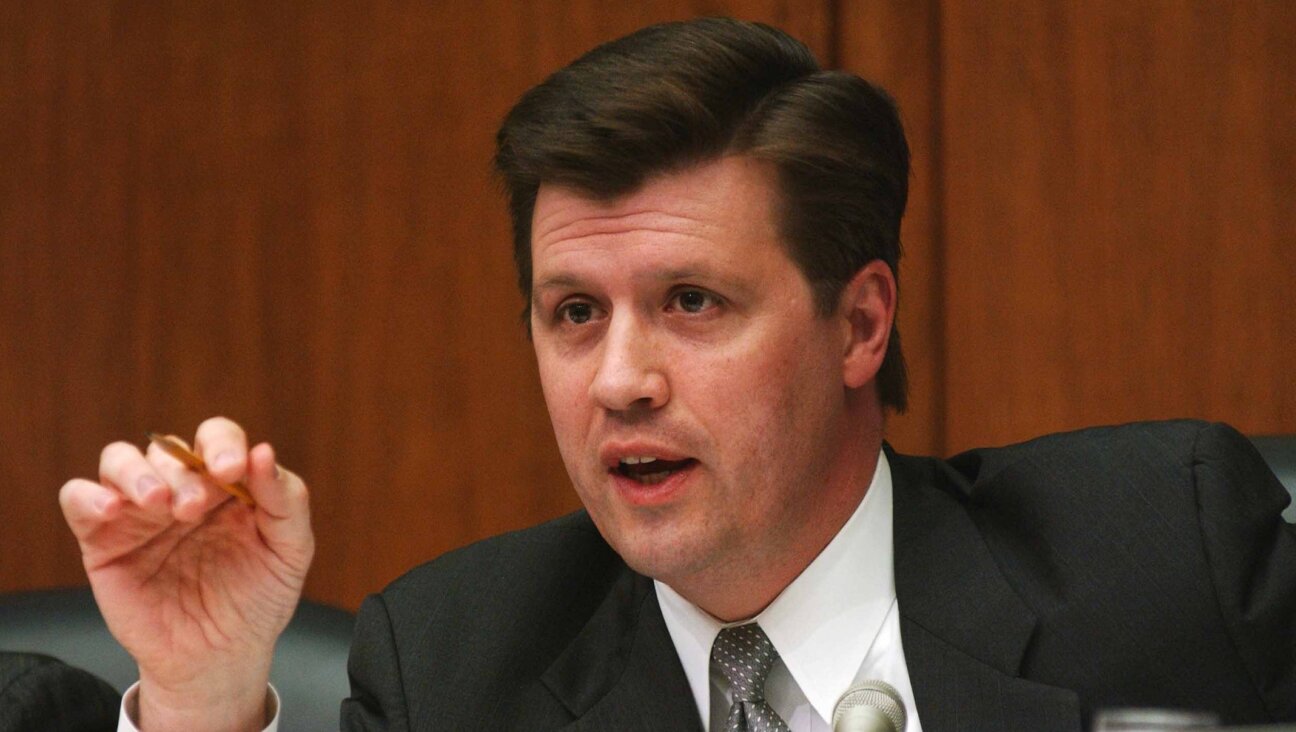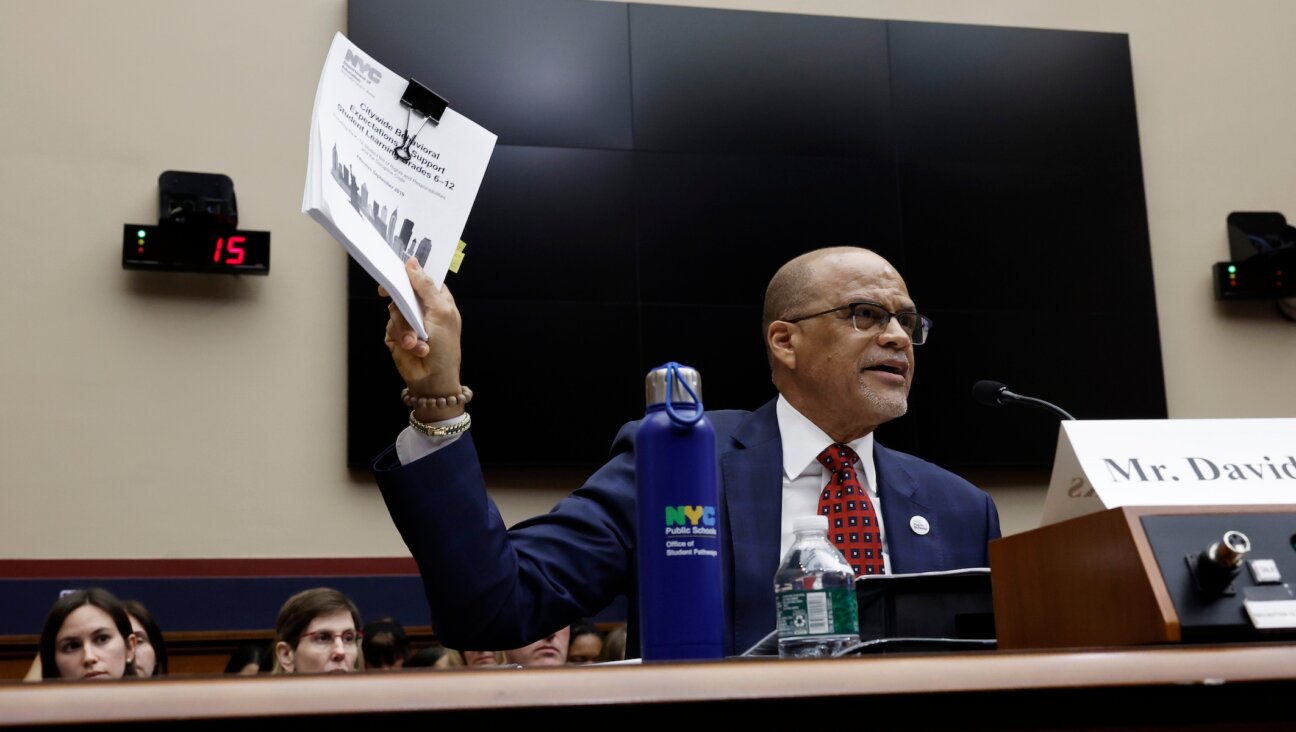GOP megadonor Bernie Marcus gives $1m to AIPAC SuperPAC, likely to fuel friction with Democrats

Former Secretary of State Mike Pompeo at the 2019 AIPAC event in Washington, D.C. Inset: Bernie Marcus. Photo by Getty Images
This article originally appeared on Haaretz, and was reprinted here with permission. Sign up here to get Haaretz’s free Daily Brief newsletter delivered to your inbox.
Jewish billionaire Bernie Marcus, one of the most significant megadonors to the Republican Party, quietly donated $1 million to the American Israel Public Affairs Committee’s super PAC in May.
The Home Depot co-founder’s donation will undoubtedly lead to renewed scrutiny of AIPAC’s United Democracy Project super PAC, since Republican funds will play a significant role in its efforts to sway Democratic primaries ahead of one of the most hotly contested elections in U.S. history.
No super PAC (political action committee) can by law directly contribute to politicians, but can solicit and spend unlimited campaign sums for or against particular candidates.
The United Democracy Project super PAC spent nearly $27 million exclusively on Democratic primaries during its debut run in the 2022 election cycle, with more than $10 million on attack ads alone. None of those ads – nor the name of the super PAC – mentioned Israel once.
Marcus was among GOP megadonors donating at least $1 million to the super PAC last election cycle. His was perhaps the first donation to raise alarm that AIPAC was allowing Republican supporters to influence Democratic elections.
The billionaire has long been known for his Jewish philanthropic efforts and support of GOP candidates and political action committees. He has steered contributions to pro-Israel candidates while bankrolling efforts aimed at promoting Israel advocacy and opposing the 2015 Iran nuclear deal.
Marcus was also among the first Republican Party mainstays to support Donald Trump. He donated $7 million to Trump’s 2016 campaign, saying that the “fate of the nation depends on sending him, and not Hillary Clinton, to the White House” – particularly due to a “leftward” shift of the Supreme Court had she been elected.
In recent years, Marcus has drawn criticism for backing GOP candidates who have compared Democrats to Nazis and bankrolling a campaign to place the Green Party on election ballots in order to take away votes from Democrats. He described attacks on Steve Bannon as a “shonda” (disgrace), defending Trump’s far-right adviser as a “passionate Zionist and supporter of Israel.”
He was one of six people to make a donation of $1 million or more to the United Democracy Project last election cycle, alongside fellow Republican megadonor Paul Singer and others who are more closely aligned to the Democratic Party like media mogul Haim Saban – a fact that AIPAC officials highlight to rebuff criticism of the source of the funding.
“UDP helped elect eight pro-Israel Democrats in 2022 that were progressives, women or candidates of color. UDP is fortunate and appreciative of the support of leading Democratic donor Haim Saban and many other Democrats in the last cycle in helping elect these Democrats and we look forward to their continued support in 2024,” said the super PAC’s spokesperson, Patrick Dorton.
Prior to the United Democracy Project’s founding in December 2021, AIPAC had historically attempted to remain apolitical and limit its work to lobbying efforts in Washington. Some of the group’s past leaders vocally criticized the super PAC’s creation, warning that AIPAC was endangering the sense of political neutrality the group had attempted to cultivate over decades.
Many Democrats echoed those fears during AIPAC’s primary spending blitz, then again after it adopted a new strategy toward the end of the primary when it funneled money to other super PACs. These then used the funding to attack progressive candidates and bolster more centrist candidates.
Democrats are concerned about the chilling effect on party criticism of Israel caused by AIPAC’s spending, believing that anything short of unconditional support for the Jewish state could become a political and electoral liability.
Some Democrats who identify as pro-Israel have offered public and private concerns that these tactics could turn Israel into an increasingly partisan issue – exactly what AIPAC ostensibly is attempting to prevent.
The only 2022 general election race in which the United Democracy Project participated was against Pennsylvania progressive (and now Congresswoman) Summer Lee. It unsuccessfully spent over $1 million on midterm attack ads, having previously donated money to try to defeat Lee in the Democratic primary months earlier.
AIPAC also came under significant scrutiny after its federal PAC endorsed more than 100 Republican candidates who refused to certify the 2020 presidential election results. AIPAC has defended both its PAC and super PAC’s efforts, saying it has a single-minded focus on Israel and endorses members of both parties accordingly.
“We are proud of our efforts to help elect pro-Israel candidates – including almost half of the Congressional Progressive Caucus. We will not be deterred by attacks against us by fringe organizations which seek to undermine the U.S.-Israel relationship,” said AIPAC spokesperson Marshall Wittmann.
Marcus’ gift portends a significant spending effort yet again in 2024, at a time where its progressive rivals are mulling strategies to take on the political behemoth while struggling to keep up financially.
To that end, the only candidate besides Lee to win despite a United Democracy Project spending blitz is Michigan Rep. Shri Thanedar. He successfully ran as a self-funded multimillionaire in an August 2022 Democratic primary against Adam Hollier.
The AIPAC affiliate has already raised $8.7 million from individual donations 15 months ahead of Election Day – already reaching 25 percent of the $35.9 million it raised the previous election cycle.
Heated battles with Justice Democrats
AIPAC increasingly finds itself opposed to a growing portion of the Democratic Party, which has expressed deep concern with Benjamin Netanyahu’s far-right government and its efforts to overhaul Israel’s judiciary. Unlike the vast majority of the U.S. Jewish establishment, AIPAC has not issued a public statement expressing concern. Instead, it has focused on Iran and echoing official government talking points that the protest movement demonstrates the vibrancy of Israel’s democracy rather than representing an existential crisis.
Justice Democrats, the organization that has helped elevate Israel’s most notable progressive critics to national prominence, recently laid off nearly half its staff. That move has many progressives concerned about potential implications on the greater movement.
Among the most critical groups of both AIPAC and pro-Israel orthodoxy in Washington since its inception six years ago, the organizational restructuring suggests Justice Democrats will be shifting its attention away from legislative efforts in Congress and more toward electing progressive candidates – setting the scene for even more heated battles with AIPAC and its PAC affiliates.
Among the likeliest primaries where United Democracy Project may involve itself is for Rep. Jamaal Bowman’s New York seat. The progressive lawmaker, a target for pro-Israel groups since in 2020 defeating AIPAC’s favorite Democrat, Rep. Eliot Engel, is expected to face a significant primary effort after becoming increasingly outspoken against the Israeli occupation and the Mideast status quo in Washington.
Bowman and other progressive critics of U.S.-Israel policy have found themselves increasingly marginalized as the GOP majority in the House has found repeated opportunities to politicize Israel through official measures – with the participation of Democratic leadership, all of whom have been endorsed by AIPAC.
“It is unfortunate that after years of grumbling to the press on the paramount importance of protecting incumbents, Democratic leadership has seemingly turned its back on ours – allowing outside groups like AIPAC to target them with multimillion-dollar primary challenges,” Justice Democrats Executive Director Alexandra Rojas told HuffPost.
The Jewish progressive movement IfNotNow has also chosen to make AIPAC a central focus ahead of the 2024 election cycle, launching a “Reject AIPAC” campaign targeting lawmakers in states with large Jewish populations.
“We’re at a crossroads. Our political and community leaders have a choice to make: are they on the side of equality, justice and a thriving future for all in Israel-Palestine and the U.S., or are they on the side of AIPAC and their extremist allies,” IfNotNow Political Director Eva Borgwardt said in a press statement.
The anti-occupation activists are demanding candidates decline endorsements and contributions from AIPAC, accusing it of being on the wrong side of the fight for democracy in both the United States and Israel.
“AIPAC is not just an obstacle to progress for Israelis and Palestinians. Their intervention in Democratic primaries serves as a huge obstacle to necessary policies like universal health care, meaningful climate action and workers’ rights. AIPAC’s endorsement should be as welcome in progressive circles as the NRA or the fossil fuel lobby,” Borgwardt added.
Progressives, meanwhile, are hoping Lee’s victory offers a blueprint for combating AIPAC’s resources by coordinating their own network of donors, operatives and local community members focused on both anti-occupation activism and ideologically consistent domestic policy.

I hope you appreciated this article. Before you go, I’d like to ask you to please support the Forward’s award-winning, nonprofit journalism during this critical time.
Now more than ever, American Jews need independent news they can trust, with reporting driven by truth, not ideology. We serve you, not any ideological agenda.
At a time when other newsrooms are closing or cutting back, the Forward has removed its paywall and invested additional resources to report on the ground from Israel and around the U.S. on the impact of the war, rising antisemitism and the protests on college campuses.
Readers like you make it all possible. Support our work by becoming a Forward Member and connect with our journalism and your community.
Make a gift of any size and become a Forward member today. You’ll support our mission to tell the American Jewish story fully and fairly.
— Rachel Fishman Feddersen, Publisher and CEO
Join our mission to tell the Jewish story fully and fairly.





















